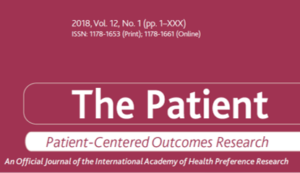IAHPR Publications Committee:
Methods for Health Preference Research
Health preference research is dedicated to understanding the value of health and health-related goods and services. This book will be a how-to guide and teaching tool, listing the major decisions and crucial steps involved in developing and conducting survey-based, health preference studies. Its steps should facilitate and promote the quality of such a preference study over its whole length. Aside from design, execution and analysis, the book emphasizes the interpretation, dissemination, and application of preference evidence to inform decisions on health and healthcare. As of July 2019, the first half of the book was drafted, compiled and distributed to the IAHPR members. The book has over 50 co-authors, will be published by Oxford University Press, and is under the supervision of four editors (listed alphabetically): Esther de Bekker-Grob, Derek S. Brown, Benjamin M. Craig and Axel C. Mühlbacher. The editors plan to complete the book by the end of 2021.
The Patient – Patient-centered Outcomes Research
 The Patient – Patient-centered Outcomes Research provides a venue for scientifically rigorous, timely, and relevant research to promote the development, evaluation and implementation of therapies, technologies, and innovations that will enhance the patient experience. It is an international forum for research that advances and/or applies qualitative or quantitative methods to promote the generation, synthesis, or interpretation of evidence.
The Patient – Patient-centered Outcomes Research provides a venue for scientifically rigorous, timely, and relevant research to promote the development, evaluation and implementation of therapies, technologies, and innovations that will enhance the patient experience. It is an international forum for research that advances and/or applies qualitative or quantitative methods to promote the generation, synthesis, or interpretation of evidence.
The Patient became an official journal of IAHPR in January 2019. The journal has published the summaries of our symposia (below), our paper series on HPR (below), and the abstracts from the 10th IAHPR Meeting (Basel), the 11th IAHPR Meeting (Auckland) and the 12th IAHPR Meeting (Durham). Under the leadership of Christopher I. Carswell, editor-in-chief, the editorial board includes many IAHPR members.
Each IAHPR meeting hosts a symposium on a topic of high interest within the Academy. The co-chairs of each meeting are responsible for writing of a brief summary of the discussion and submitting it for peer-review publication so that researchers within the broader HPR community can benefit from their insights. Within the topical collection, “From the International Academy of Health Preference Research,” symposium summaries include:
- Preference Evidence for Regulatory Decisions – Boston, 6 July 2017
- The Econometrics of Preference Heterogeneity – Glasgow, 3 November 2017
- Design of Discrete Choice Experiments – Hobart, 27 September 2018
- Support Tools for Preference-Sensitive Decisions – Montréal, 14 October 2018
- Patient Preferences in the Medical Product Lifecycle – Basel, 13 July 2019
- The Patient Perspective: A Matter of Minutes – Basel, 13 July 2019
- Giving a voice to marginalised groups for health care decision making – Auckland, 2 December 2019
IAHPR Development Committee:
Health Preference Study and Technology Registry (HPSTR.org)
 Applicable to a wide range of research and applications, the Health Preference Study and Technology Registry (HPSTR™) is a registry of studies and technologies from around the world. Version 1 of the registry was launched on 1 March 2017 and version 2 was completed in June 2019. It currently includes over 1000 records and expects to have all published health preference studies by the end of 2022. In addition, its directories lists researchers, organizations, and journals by the number of studies.
Applicable to a wide range of research and applications, the Health Preference Study and Technology Registry (HPSTR™) is a registry of studies and technologies from around the world. Version 1 of the registry was launched on 1 March 2017 and version 2 was completed in June 2019. It currently includes over 1000 records and expects to have all published health preference studies by the end of 2022. In addition, its directories lists researchers, organizations, and journals by the number of studies.
Past Collaborations
Videos in Health Preference Research
The Academy has started to accumulate and post a list of videos in health preference research.
If you know of other HPR videos that we may add to this list, please send a note to contact@iahpr.org
Papers on Health Preference Research
To provide an overview of the field in 2017, the Faculty wrote six brief papers launching the field of health preference research, which were published in the Patient – Patient-centered Outcomes Research. Jan Ostermann and Benjamin M. Craig served as the co-editors for this series and the IAHPR Office coordinated the efforts of those who expressed interest in preparing this overview. These papers briefly define “health preference research” as a emerging field and its relevance for regulatory policy, medical recommendations and clinical practice. According to Google Scholar and PubMed, this series was the first use of the term “health preference research” creating a clear milestone for our field.
- Health Preference Research: An Overview
- Preferences for Health Interventions: Improving Uptake, Adherence, and Efficiency
- Health Valuation: Demonstrating the Value of Health and Lifespan
- Assessment of Individual Patient Preferences to Inform Clinical Practice
- Giving Patients a Meaningful Voice in United States Regulatory Decision Making
- Giving Patients a Meaningful Voice in European Health Technology Assessments
EQ DCE Predictive Modeling Competition
In 2016, the Academy hosted a predictive modeling competition through the support of a grant from the EuroQol Research Foundation. Coming from all over the world, teams registered and submitted their predictions. After posting these predictions, Drs. Craig and Rand conducted the confirmatory survey. The team with the “best” predictions (i.e., smallest chi square) was announced at the 2016 EuroQol Plenary Meeting. For more information: CLICK HERE
